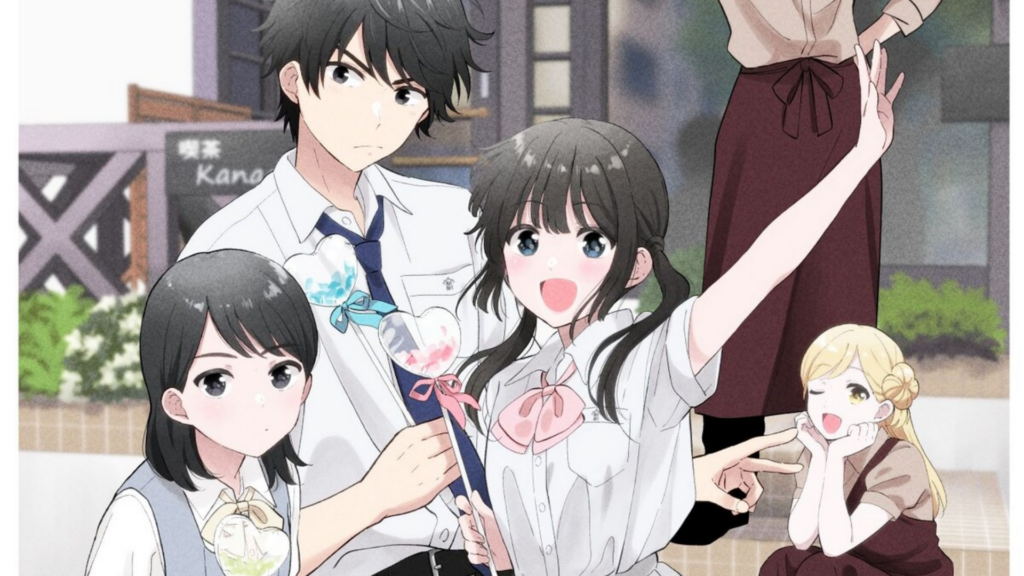The popular manga titled “I Want to End This Love Game” (originally “Aishiteru Gemu O Owara Setai”), created by Yuki Domoto, is set to make its debut as a television anime. This exciting news was revealed on June 12, a date that holds special significance in Japan as it is known as “Lover’s Day.” While fans are eagerly anticipating more information regarding the airing schedule and the voice cast, details are expected to be released in the near future.
“I Want to End This Love Game” has captivated readers since its serialization began on Shogakukan’s Sunday Webry platform in December 2021. As of April 10, 2024, the manga has released six volumes, with an English translation handled by VIZ Media, who published the sixth volume on May 13, 2025. The narrative centers around Yukiya, a once-shy and introverted nerd who experiences a remarkable transformation during high school. His goal? To win the heart of his closest friend, Miku.
The story is uniquely inspired by Miku’s favorite shojo manga, which propels Yukiya to express his feelings through extravagant romantic gestures, aiming to capture her affection. However, his attempts to translate what he has read into real-life scenarios often lead to comical blunders and misunderstandings, complicating the unspoken feelings that lie between them.
The essence of Yukiya’s character is relatable for many, especially those who have experienced the struggles of adolescence and the complexities of young love. His journey through self-improvement and the awkwardness that accompanies it resonates with a wide audience, making it a compelling read. As he navigates his way through high school, Yukiya encounters various challenges that many teenagers face, including peer pressure, self-esteem issues, and the quest for acceptance.
What makes “I Want to End This Love Game” particularly engaging is its blend of humor and heartfelt moments. The manga artfully balances Yukiya’s comedic attempts to win over Miku with more serious undertones about friendship and love. These elements create a narrative that feels both lighthearted and profound, allowing readers to connect with the characters on multiple levels.
Furthermore, Yukiya’s determination to change himself for love speaks to the universal theme of personal growth. His character arc illustrates that transformation is not just about physical appearance but also about emotional maturity and understanding one’s feelings. This theme is especially pertinent for young adults who often grapple with identity and self-worth.
As the manga continues to gain popularity, the anticipation for its anime adaptation is palpable. Fans are eager to see how the vibrant illustrations and dynamic storytelling will translate onto the screen. The anime format has the potential to bring Yukiya and Miku’s story to life in a new and exciting way, allowing for a broader audience to experience their journey.
In addition to the main storyline, the supporting characters in “I Want to End This Love Game” add depth and richness to the narrative. Friends and classmates contribute to the comedic situations that arise, often providing a foil to Yukiya’s character. These interactions highlight the importance of friendship in the pursuit of love, showcasing how these relationships can influence personal growth and emotional development.
The art style of Yuki Domoto is another aspect that enhances the storytelling. The illustrations are vibrant and expressive, capturing the emotions of the characters and the nuances of their interactions. This visual appeal is likely to be a significant draw for viewers of the upcoming anime adaptation, as animation can amplify the emotional weight of scenes that may be more muted in printed form.
In terms of themes, “I Want to End This Love Game” delves into the awkwardness of teenage romance, a subject that resonates with many young readers. The series does not shy away from depicting the realities of unrequited feelings, the fear of rejection, and the challenges of expressing oneself. Yukiya’s experiences serve as a reminder that love is often messy and complicated, filled with both joy and disappointment.
As the anime adaptation approaches, discussions among fans are already sparking excitement about potential changes in the storyline or character development. While adaptations often take creative liberties, the core of Yukiya and Miku’s relationship will likely remain intact, appealing to both long-time readers and newcomers alike.
The timing of the announcement on Lover’s Day is fitting, as it underscores the romantic themes that permeate the story. This connection to a day dedicated to love adds an extra layer of excitement to the adaptation, aligning the release with the sentiments of the source material.
In conclusion, “I Want to End This Love Game” stands out in the world of manga for its relatable characters, engaging storytelling, and humorous yet poignant exploration of young love. With its transition to anime, the narrative promises to reach new heights, captivating audiences with its charm and emotional depth. As fans await further details about the adaptation, the anticipation continues to grow, proving that Yukiya and Miku’s journey is far from over.
